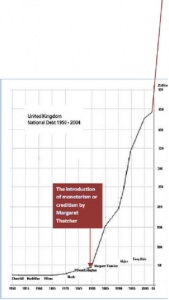 The Road to Calvary
The Road to Calvary
No servant can serve two masters: for either he will hate the one, and love the other; or else he will hold to the one, and despise the other. Ye cannot serve God and mammon [1]
Luke 16:13
t
There are two principal reasons for the massive divisions of poverty and wealth which have led to exploitation and slavery, and in turn, the conditions which provoke men into war, murder, torture and other barbarities. Fortunately, God’s Law deals with the two greatest causes of poverty and slavery:
- The debt system based on usury
- The myth of title to land
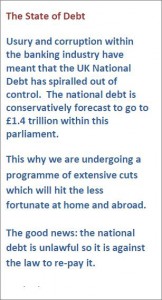 Usury
Usury
‘And what do you think of usury?’
‘What do you think of murder?’
Cato, De Re Rustica
Usury is odious in law
A contract founded on a base and unlawful consideration, or against good morals, is null.
Maxims of Law
e
In the Bible
If thou lend money to any of my people that is poor by thee, thou shalt not be to him as an usurer, neither shalt thou lay upon him usury.
Exodus 22:25
Take thou no usury of him, or increase: but fear thy God; that thy brother may live with thee. Thou shalt not give him thy money upon usury, nor lend him thy victuals for increase.
Leviticus 25:36-38
Thou shalt not lend upon usury to thy brother; usury of money, usury of victuals, usury of any thing that is lent upon usury: Unto a stranger thou mayest lend upon usury [2]; but unto thy brother thou shalt not lend upon usury: that the LORD thy God may bless thee in all that thou settest thine hand to in the land whither thou goest to possess it.
Deuteronomy 23:19-20
Then I consulted with myself, and I rebuked the nobles, and the rulers, and said unto them, Ye exact usury, every one of his brother. And I set a great assembly against them.
Nehemiah 5:7
I likewise, and my brethren, and my servants, might exact of them money and corn: I pray you, let us leave off this usury.
Nehemiah 5:10
He that putteth not out his money to usury, nor taketh reward against the innocent. He that doeth these things shall never be moved.
Psalm 15:5
He that by usury and unjust gain increaseth his substance, he shall gather it for him that will pity the poor.
Proverbs 28:8
a
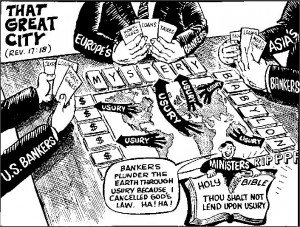 The Biblical Christ refers to usury in The New Testament parable of the ten gold pieces, in which the master says to his servant:
The Biblical Christ refers to usury in The New Testament parable of the ten gold pieces, in which the master says to his servant:
‘Wherefore then gavest not thou my money into the bank, that at my coming I might have required mine own with usury?’
Luke 19:23
‘Thou oughtest therefore to have put my money to the exchangers, and then at my coming I should have received mine own with usury.’
Matthew 25:27
s
In the parable, the nobleman or master has given three servants money for safekeeping. Two of them profitably invest his money and get a good return. The third puts it under a rock, which gives no return. When challenged, the third servant accuses his master of taking up what he has not laid down and reaping what he has not sown — the offences of stealing and exploitation. Immediately following these false accusations, the master responds:
‘Out of thine own mouth will I judge thee, thou wicked servant. Thou knewest that I was an austere man, taking up that I laid not down, and reaping that I did not sow. Wherefore then gavest not thou my money into the bank, that at my coming I might have required mine own with usury?’
Luke 19:22-23
‘If you really thought that I was austere and stole from and exploited my fellow man — as you accuse me now — then why didn’t you go the whole hog and invest my money at interest?’
The master is saying he might as well be hanged for a sheep as for a lamb — or might as well really annoy God by committing the offence of usury, the easy way of stealing.
The meaning of the story is clear. Investing money at genuine risk is not against the Law of God. But usury is worse than stealing and exploitation. If we are in any doubt about Christ’s attitude to lending then it is clarified in the following passage of the Bible:
But love ye your enemies, and do good, and lend, hoping for nothing again; and your reward shall be great.
Luke 6:35
It is easier for a camel to go through the eye of a needle than for someone who is rich to enter the kingdom of God.
Matthew 19:24, Mark 10:25, Luke 18:25, NIV
b
In law
It is clear that both the New and Old Testaments forbid usury. So how is ‘usury’ defined in law?
Latin Usura: ‘the amount paid for the use of money’; interest. 2. Usury
Usury: ‘Historically, the lending of money with interest. 2. Today the charging of an illegal rate of interest as a condition of lending money. 3. An illegally high rate of interest’.
Black’s Law, 9th edition
s
Black’s Law makes two points clear. First, when the New Testament was written, ‘usury’ meant any amount paid for the use of money, including any form of interest. Christ famously throws the ‘usurers’ out of the temple because they were charging a commission to convert Roman denarii into shekels for the payment of temple taxes. As moneychangers, they were not charging interest but drew Christ’s condemnation for charging for monetary services. Second, the definition of ‘usury’ has been changed so that it means charging an illegal rate of interest rather than interest per se.
If there is an illegal rate of interest, there must be a ‘legal’ one but I cannot find any Act of Parliament which makes usury legal or sets a ‘legal’ rate of interest [3].
b
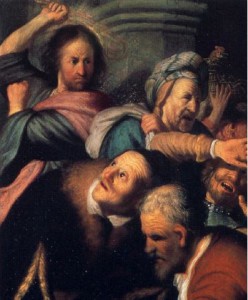
Rembrandt’s Christ driving the Usurers from the Temple, 1626. This is probably the best known and most loved story in the world’s best selling book, the Bible. ‘Throwing the usurers out of the temple’ is figurative language prophecying Christ bringing usury to an end by removing it from the ‘temple’, or the universe
Why usury is unlawful
It is therefore clear that the definition of the word has been deliberately changed in order to get around the Law. Christ’s intention was to make all making of money from money unlawful. And there is good reason for this. Charges or interest accrued have to be met from somewhere because money in itself does not create wealth. Traditionally therefore, the burden falls on the true wealth creators – anybody who does anything useful or creates something of genuine value – who become legally obliged to pay a part of that wealth to bankers who either charge interest or take a fee for their services.
In the case of the national debt, this has now reached epidemic proportions with the poorest in the world subsidising the richest through taxation. In a global economy, this means children either starving to death or working in sweatshops for a pittance while bankers invest their ill-gotten gains in manufacturing war and terrorism. For the sake of sanity, this has to stop.
We have often heard from right wing loonies that trade unions or governments interfere in the ‘free market’. Strangely these people never point out that the current market is utterly controlled by the banks because those who get credit have the opportunity to prosper and those who do not go out of business and have their assets seized by the banks. This is not even Capitalism, where existing capital is reinvested in new projects. It is Creditism, where money is created out of thin air every time a loan is taken out.
While Capitalism carried a genuine risk — because the new venture might fail and the capital be lost – there is no risk of loss in Creditism because the sum of money is created when the loan is taken out. Even if the debtor fails to make a single repayment, the institution offering the loan has not lost a penny on the transaction.
Under the Law, you have no duty to repay any debt raised at interest or meet any bank charge or commission for the keeping, handling or exchange of money. This will no doubt be particularly good news to those repaying a mortgage or other onerous debt. Just ask for a lawful bill of settlement. A corporation will not be able to supply one.
E
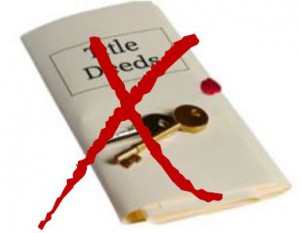
The Right to hold Land and Property
A contract founded on a base and unlawful consideration, or against good morals, is null.
Maxim of Law
The legal fiction of title to land is probably the greatest cause of suffering, poverty and dependency known to man.
As the trustee of the nation and on behalf of God, the monarch holds allodial right to land in English law. Black’s Law 9th edition has done its very best to obscure the distinction between ‘allodial’ and ‘absolute’ title in its definitions:
Allodial. Held in absolute ownership […]
The term ‘allodial’ originally […] meant land held in absolute ownership, not in dependence upon any other body or person in whom the proprietary rights were supposed to reside […]It would thus properly apply to the land which in the original settlement had been allotted to individuals, while bookland was primarily applicable to land the title to which rested on formal grant. Before long however the words appear to have been used synonymously to express land held in absolute ownership.
Kenelm E Digby, An introduction to the History of the Law of Real Property, 11-12 (5th edition, 1897)
[…]
Absolute title. An exclusive title to land; a title that excludes all others not compatible with it.
Black’s Law 9th edition
t
However, the difference in meaning can still be discerned. Under allodial right, ownership is absolute (in the true sense of the word). So-called ‘absolute title’ is ‘exclusive’ of others not ‘compatible with it’. Where the two clash, it is clear that absolute title is not compatible with an allodial right, which takes precedence as, in the case of the Queen, it is part of the divine right of kings to rule and act as final arbitrator of Law. The monarch’s right to land comes from God. Title to land is a creation of man.
Indeed, earlier editions of Black’s Law make the distinction much clearer:
ALLODIAL. Free; not holden of any lord or superior; owned without obligation of vassalage or fealty; the opposite of feudal. […]
Absolute title: as applied to title to land, an “absolute” title means an exclusive title, or at least a title which excludes all others not compatible with it; an absolute title to land cannot exist at the same time in different persons or in different governments. […]
TITLE […] real property law. Title may be defined generally to be the evidence of right which a person has to the possession of property. The word “title” certainly does not merely signify the right which a person has to the possession of property; because, there are many instances in which a person may have the right to the possession of property, and at the same time have no title to the same. In its ordinary legal acceptation, however, it generally seems to imply a right of possession also. It therefore appears, on the whole, to signify the outward evidence of the right, rather than the mere right itself.
Black’s Law, 2nd edition, 1910
i
From the above, it is clear that allodial right takes precedence over ‘absolute’ title. We also have to wonder why Black’s Law 9th edition sees fit to quote a work from 1897:
Before long however the words appear to have been used synonymously to express land held in absolute ownership.
This gives the impression that somehow ‘allodial’ and ‘absolute’ became synonymous in the 19th century when in fact Black’s itself continued to distinguish between the two in its 2nd edition, which existed later than the source quoted, in 1910. To be charitable, it is a curious reference work which ignores its own authority. To be accurate, this is clear proof that Black’s Law is an attempt to undermine the rule of Law – which is mandatory – by the underhand method of redefining words. You can kiss my arse and call it ‘chocolate’ but that doesn’t mean it is chocolate. Or it tastes like it.
It is also clear that any man has a greater claim to hold land under the Law than any ‘person’ claiming ‘absolute title’ under civil law as ‘person’ and ‘absolute title’ are both legal fictions. According to the Bible, God gives man – not individuals or persons — dominion over the earth.
- Any man is entitled to hold land, subject to the Law
- An English man’s house is his castle. He therefore has the right to use force against anyone trying to enter his property without consent or lawful authority
- It is unlawful to in any way buy or sell or otherwise trade in land
- All title to land is a legal fiction
- The Sovereign adjudicates in any dispute over the use of land
O
If any man therefore sets aside the Law’s demands, and teaches others to do the same, he will have the lowest place in the kingdom of Heaven, whereas anyone who keeps the Law and teaches others so will stand high in the kingdom of Heaven. I tell you, unless you show yourselves far better men than the Pharisees and the doctors [4] of the law, you can never enter the Kingdom of Heaven.
Matthew 5:19-20, The New English Bible
Footnotes
[1] ‘Mammon’ is generally defined as the love or worship of money and material wealth. The latest translation of the Bible simply translates it as ‘money’.
[2] Although many Jews have taken this as a green light to lend at interest to gentiles, the Torah on numerous occasions exhorts the Israelites not to discriminate against strangers, expressed in the context of law as the maxim ‘All men and women must be treated equally under the Law’ (and by the ‘Love your neighbour as you love yourself… ‘ commandment).
[3] A search of the database of UK statutes (www.legisalation.gov.uk) for ‘usury’ returns no results.
[4] ‘Doctor’ is Greek for ‘teacher’. It is only in English that the medical profession has got away with stealing one of the Messiah’s titles, ‘The Teacher’, and his initials ‘D M’, which they render as ‘M.D.’